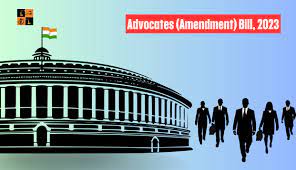
The Advocates Amendment Bill

14.12.2023
The Advocates Amendment Bill , Daily Current Affairs , RACE IAS : Best IAS Coaching in Lucknow
|
For Prelims:Key Features of Advocates (Amendment) Bill, 2023,Key Points,Key features of Advocates Act of 1961 (now amended)Before this, legal practitioners were governed by three Acts For Mains paper:What does the Advocates Amendment Bill, 2023, say?,Key features of Legal Practitioners Act, 1879 (now repealed) |
Why in the news?
Recently, on the first day of the Parliament’s Winter Session, the Advocates Amendment Bill, 2023 was passed in the Lok Sabha.
Key Points
- The Advocates (Amendment) Bill, 2023, was passed in the Rajya Sabha in August, 2023. Recently, during the winter session, the bill was passed from LS.
- Aimed at weeding out touts from the legal system, the Bill:
○repeals the Legal Practitioners Act, 1879, and
○amends the Advocates Act, 1961.
- This was done in order to reduce the number of superfluous enactments in the statute book and repeal all obsolete laws.
- This is in line with the government’s policy of repealing all obsolete laws or pre-independence Acts that have lost their utility.
What does the Advocates Amendment Bill, 2023, say?
- The new Bill now amends the 1961 Act by inserting a new provision right after Section 45, which prescribes six months of imprisonment for persons illegally practising in courts and before other authorities.
- The new provision, Section 45A, states that the Bill enables every HC and district judge to frame and publish lists of touts. However, no person’s name will be included in any such list until they have had an opportunity to show cause against such inclusion.
- Further, any authority empowered to make lists of alleged or suspected touts can send them to any subordinate court, which, after holding an inquiry into the conduct of such persons, will allow them an opportunity to show cause. After this, the lower court will report back to the authority ordering the inquiry.
- If proven to be a tout, the person’s name will be included in the list of touts that will be published by the authority and hung in every court. The court or judge may exclude any person whose name is included in any such list from the court’s vicinity.
- Additionally, this provision punishes anyone acting as a tout “while his name is included in any such list” with imprisonment up to three months, a fine that may extend to five hundred rupees, or both.
- Section 45A of the new Bill is analogous to Section 36 of the 1879 Act. However, the 1961 Act did not include the provision. This is exactly what the new Bill sought to remedy.
- Doing so would “reduce the number of superfluous enactments in the statute book,” says the Bill’s accompanying Statement of Objects and Reasons.
Key Features of Advocates (Amendment) Bill, 2023:
Touts:
- The Bill provides that every High Court, district judge, sessions judge, district magistrate, and revenue officer may frame and publish lists of touts.
- The Court or judge may exclude from the premises of the Court any person whose name is included in the list of touts.
Preparation of lists:
- The authorities empowered to frame and publish the list of touts may order subordinate courts to hold an inquiry into the conduct of persons alleged or suspected to be touts.
- Once such a person is proven to be a tout, his name may be included by the authority in the list of touts.
- No person will be included in such lists without getting an opportunity of showing cause against his inclusion.
Penalty:
- Any person who acts as a tout while his name is included in the list of touts will be punished with imprisonment up to three months, a fine up to Rs 500, or both.
Key features of Legal Practitioners Act, 1879 (now repealed)
- This act aimed to consolidate and amend the law relating to Legal Practitioners in certain provinces.
- Section 2 of the 1879 Act defined the term legal practitioner to include advocates, vakils, or attorneys of any High Court.
- someone who procures, in consideration of any remuneration from any legal practitioner, the employment of a legal practitioner in any legal business; or
- one who proposes to any legal practitioner or anyone interested in any legal business to procure, for remuneration, the employment of the legal practitioner in such business.
- Simply, a tout is someone who procures clients for a legal practitioner in exchange for payment.
Key features of Advocates Act of 1961 (now amended)
- The Advocates Act, 1961, was enacted to amend and consolidate the law relating to legal practitioners and to provide for the constitution of Bar Councils and an All-India Bar.
Before this, legal practitioners were governed by three Acts:
○the Legal Practitioners Act, 1879,
○the Bombay Pleaders Act, 1920, and
○the Indian Bar Councils Act, 1926.
- The Law Commission, in its 249th Report, titled ‘Obsolete Laws: Warranting Immediate Repeal’, recommended repealing the 1879 Act.
- Additionally, the All-India Bar Committee made its recommendations on the subject in 1953. Taking these into account, the 1961 Act was passed.
Source:Indian Express